Marrying Vega and Zen: The AMD Ryzen 5 2400G Review
by Ian Cutress on February 12, 2018 9:00 AM ESTBenchmarking Performance: CPU Encoding Tests
One of the interesting elements on modern processors is encoding performance. This includes encryption/decryption, as well as video transcoding from one video format to another. In the encrypt/decrypt scenario, this remains pertinent to on-the-fly encryption of sensitive data - a process by which more modern devices are leaning to for software security. Video transcoding as a tool to adjust the quality, file size and resolution of a video file has boomed in recent years, such as providing the optimum video for devices before consumption, or for game streamers who are wanting to upload the output from their video camera in real-time. As we move into live 3D video, this task will only get more strenuous, and it turns out that the performance of certain algorithms is a function of the input/output of the content.
All of our benchmark results can also be found in our benchmark engine, Bench.
7-Zip 9.2: link
One of the freeware compression tools that offers good scaling performance between processors is 7-Zip. It runs under an open-source licence, is fast, and easy to use tool for power users. We run the benchmark mode via the command line for four loops and take the output score.
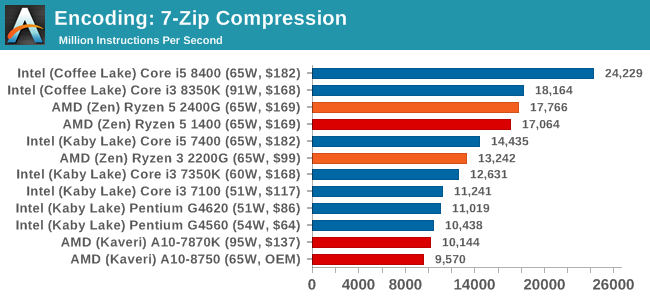
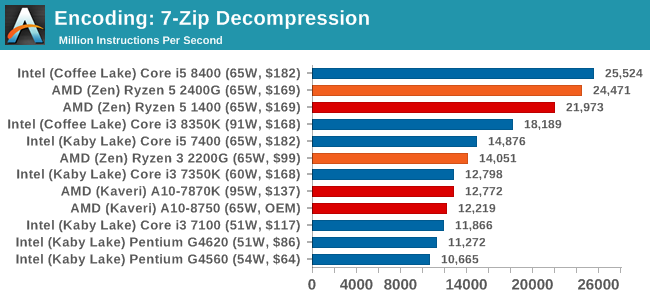
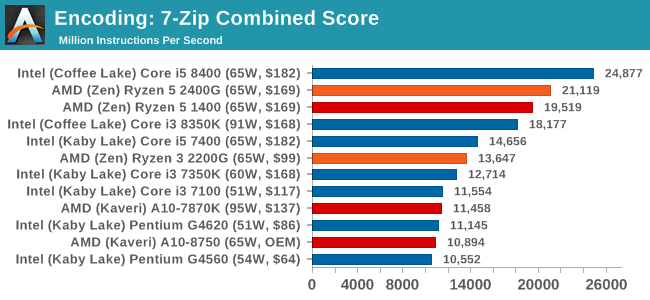
7-zip gives two contrasting stories here. For compression, full cores are needed to get the best performance, with frequency helping as well. However, for decompression, the extra threads help a lot. The combined result looks more like the decompression score, with the Ryzen 5 2400G sitting between the six-core Core i5-8400 and the quad-core Core i3-8350K.
WinRAR 5.40: link
For the 2017 test suite, we move to the latest version of WinRAR in our compression test. WinRAR in some quarters is more user friendly that 7-Zip, hence its inclusion. Rather than use a benchmark mode as we did with 7-Zip, here we take a set of files representative of a generic stack (33 video files in 1.37 GB, 2834 smaller website files in 370 folders in 150 MB) of compressible and incompressible formats. The results shown are the time taken to encode the file. Due to DRAM caching, we run the test 10 times and take the average of the last five runs when the benchmark is in a steady state.
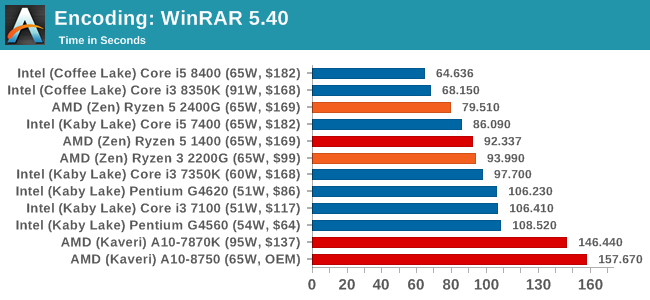
WinRAR is a good scaler with cores, frequency, and memory performance. The eight threads and DDR4-2933 contributes a good amount to the performance here, especially in light of where AMD was. The jump from the Ryzen 5 1400 to the 2400G is also noticable, due to the uptick in frequency and memory speed. The high single-thread performance of the Intel cores still wins out, however.
AES Encoding
Algorithms using AES coding have spread far and wide as a ubiquitous tool for encryption. Again, this is another CPU limited test, and modern CPUs have special AES pathways to accelerate their performance. We often see scaling in both frequency and cores with this benchmark. We use the latest version of TrueCrypt and run its benchmark mode over 1GB of in-DRAM data. Results shown are the GB/s average of encryption and decryption.
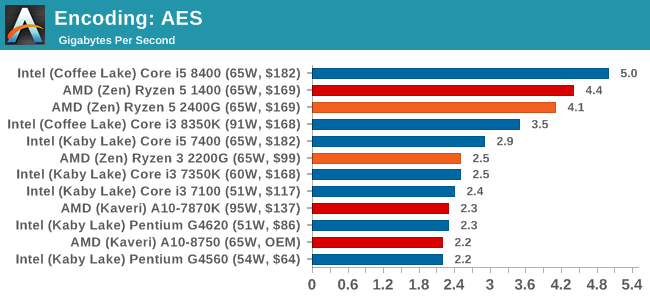
HandBrake v1.0.2 H264 and HEVC: link
As mentioned above, video transcoding (both encode and decode) is a hot topic in performance metrics as more and more content is being created. First consideration is the standard in which the video is encoded, which can be lossless or lossy, trade performance for file-size, trade quality for file-size, or all of the above can increase encoding rates to help accelerate decoding rates. Alongside Google's favorite codec, VP9, there are two others that are taking hold: H264, the older codec, is practically everywhere and is designed to be optimized for 1080p video, and HEVC (or H265) that is aimed to provide the same quality as H264 but at a lower file-size (or better quality for the same size). HEVC is important as 4K is streamed over the air, meaning less bits need to be transferred for the same quality content.
Handbrake is a favored tool for transcoding, and so our test regime takes care of three areas.
Low Quality/Resolution H264: Here we transcode a 640x266 H264 rip of a 2 hour film, and change the encoding from Main profile to High profile, using the very-fast preset.
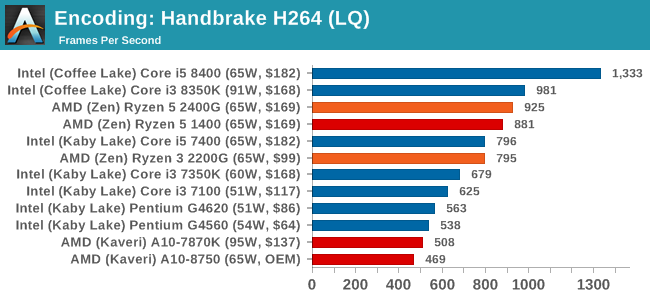
High Quality/Resolution H264: A similar test, but this time we take a ten-minute double 4K (3840x4320) file running at 60 Hz and transcode from Main to High, using the very-fast preset.
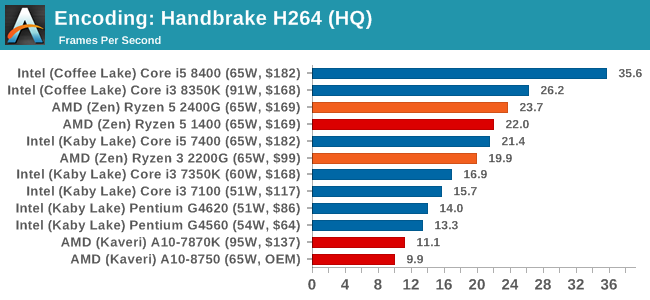
HEVC Test: Using the same video in HQ, we change the resolution and codec of the original video from 4K60 in H264 into 4K60 HEVC.
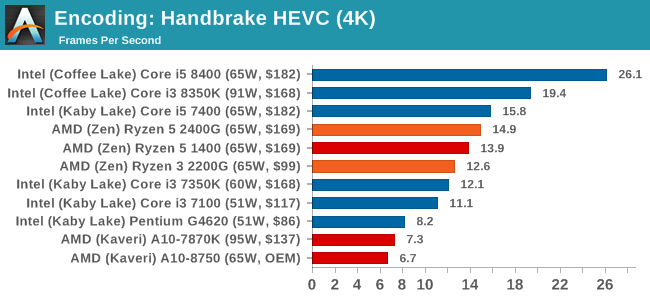










177 Comments
View All Comments
SSNSeawolf - Monday, February 12, 2018 - link
Wonderful, that's understandable. Always appreciate the time you take to slog through the comments, Ian.HStewart - Monday, February 12, 2018 - link
It might be me - unless you are really serious gamer and need high end performance, I see no reason to use a desktop CPU and GPU in todays world.Holliday75 - Monday, February 12, 2018 - link
That appears to be the case. This CPU would be my go to option for any family member wanting a PC these days. The flexibility it offers is remarkable.B3an - Monday, February 12, 2018 - link
Mistake on the Blender benchmark. The latest version is 2.79 but you've put "2.78". Being as you also have a nightly build you might even have 2.8 if you've got it from the 2.8 nightly branch. Either way you will have at least 2.79.milkod2001 - Monday, February 12, 2018 - link
Looks like decent but still 720 gaming at the best. How far away are we from 40-50fps 1080p gaming from APU?richardginn - Monday, February 12, 2018 - link
Depending on the game you are going to play you will need low settings to get 40-50fps 1080p gaming from this APU,.Yaldabaoth - Monday, February 12, 2018 - link
Great article. However, because I am a pervert, I would LOVE to see some heterogeneous GPU action going on. "Does an AMD 2400G and a nVidia 1050 make a baby that is like a 1050 TI? What about if it mated with a Vega 56 or 580?" Know what I mean? [Nudge-nudge] Know what I mean?Threska - Wednesday, February 14, 2018 - link
Heterogeneous would be an APU, not crossfire. Far as AMD's plans with HSA who knows? They're not doing much talk about it since Zen came out. Maybe they don't need it now that their single thread performance is competitive?Pork@III - Monday, February 12, 2018 - link
Core i7-8809G will smash easily Ryzen 5 2400Ganactoraaron - Monday, February 12, 2018 - link
If cost is no concern, then yes.